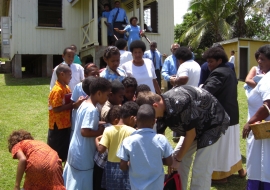
The Need
A recent survey by the Fred Hollows Foundation (NZ) found that 40% of the Fijian population over the age of 40 has diabetes. Worse yet, 82% of the Fijian population has a high risk of developing the disease. Without a change in lifestyle and education, the disease will continue to spread, harming families, communities, and stifling economic growth. Despite the high incidence of diabetes, zero research has been carried out in the remote northern islands, where the disease is destroying rural communities. Yet kindly intervention now can mitigate this alarming trend. With modest outside support, we can make it happen.
Who We Are
The Naqaqa Giving Foundation (NGF) has worked in rural Fiji for eight years. A 501(c)(3) not-for-profit incorporated in California, we are based in Savusavu, Fiji, but operate throughout the northern islands, where education and healthcare are in shortest supply. NGF is perfectly positioned to close that gap; we know how to get things done in Fiji. We are part of the community. Our workers are Fijians. We have provided hundreds of years of scholarships, along with water systems and housing for the poor. Our latest and largest project is the Savusavu Medical Center, which has become the region’s cleanest and best-equipped medical facility. We have also improved patient access to primary care by reducing wait times. We work closely with village elders, government, the heads of local schools, and community leaders. They help us determine the viability and value of new programs. They unanimously support the diabetes treatment and prevention project outlined below.
The Project
In Fiji, women most severely affected by diabetes and they are our primary targets, not only because they are most in need, but they control how the family eats. Their healthy choice will extend to their children and husbands. We have selected 11 villages (2500 people) in Northern Fiji, each near the town of Savusavu, to take part in our program. One village representative will become a Community Health Worker, whom we will train. The training will include tutelage from a team of nutritionists, a doctor, a health educator, and a physiotherapist. All of these experts will be Fijian because we have seen that information from a familiar face is received much more favorably. Prior to training, a doctor and team of PhD students from the University of the South Pacific will develop a baseline health profile of all villages for the project. This research not only assures we have concrete data, but also will provide critical information to other local organizations focusing on the region’s health.
Following training, the Community Heath Workers will return to their villages and begin identifying those who are diagnosed with diabetes or who are pre-diabetic. While the worst off will be given free medical care and customized exercise and dietary plans, the entirety of the village will learn healthy recipes that combine locally available foods. We are going to make it as easy as possible for villages to fight and prevent diabetes themselves; they just need an efficient medical delivery system, education, and viable options to change their behavior.
The Incentive
Increased and improved life is not enough of a motivator, so we need to connect in a way easier to digest. The village that shows the greatest improvement in diabetes management and prevention will be rewarded beyond the direct health benefits. The winning village will have all of its pre-university school fees paid for the following year, which is the biggest yearly one-off cost to families. In addition, the project is to receive National TV coverage and their success will be known throughout the nation, which is a great motivator. Our press campaign will also see that details of the program and the success of the program be reported in the national printed media. This public attention is not just an incentive but also a way to spread the information so valuable in decreasing the impact of diabetes nationally.
The Aim
Our goal to slightly alter the way people eat and increase regular exercise as part of community routine, thus reducing diabetes in the future. All residents of participating villages will be affected to some degree, but especially participants, their children, parents and spouses. Those diagnosed with diabetes will learn how to manage the disease, slowing potential complications through medicine and lifestyle change. We are on the ground, prepared, and ready to go; all we need is one-time funding to carry out and demonstrate this approach. The time is now, while the epidemic is climbing. After demonstrating the success of this project with independently reviewed scientific data, we hope to replicate our gains in other parts of the country, where the need is just as great.
Please email us to receive a copy of our full proposal.




